Quarantine In Cusco: Week 2
As my world shrinks, I try to appreciate what is close to home.
Sunday, 22 March, 2020
This morning I sat down in my home office to watch the birds in the trees outside my second floor window. I posted a couple things on Instagram, checked my emails and Facebook and WhatsApp. I Facetimed with Mom. All of the technology that we rely on, that I hope will help keep me sane during the quarantine.
I’ve been watching live concerts on Instagram most evenings. Even that virtual connection, since it’s in real time, helps. They’re each home alone, isolated physically but playing music to keep the connection with their fans. Between songs, the main singer for the band Las Cafeteras from LA says that she is trying to reframe the term “social distancing” to “social deepening.” I like that idea a lot. It makes me think about all the people I have been in contact the past week who I hadn’t heard from in months. All of the technology that I have access to, that I can use to create my own version of social deepening.
I did answer some work emails today. I usually work four hours either Saturday or Sunday, but now that it’s just me, I kind of work all the time. I try to limit it to what used to be normal: 9am to 1pm, break for lunch, then work 3pm to 7pm. Happily, Gmail crashes and I can’t work anymore. I take my book and go across the street to sit on a bench in the park and read, with the sun warming my back. It feels so good to be outside, to feel the sun on me. It’s not just the vitamin D. Feeling the sun warm me cheers me up too.
President Vizcarra gave another address tonight. He announced that we have 363 confirmed cases in Peru, of which 31 are in critical condition in intensive care units. We have had five deaths in Peru from COVID-19. He also confirmed that in Cusco we are still at 4 cases and some regions of Peru don’t have any. He quickly followed that statement with a caution of how we do not have enough tests in Peru. There are probably patients with COVID-19 who have not been able to get tested yet. We have ordered a million tests and are still waiting for them to be delivered. He warned us to expect the numbers to keep going up, especially as we will soon be able to test more people.
Besides Lima, the largest jump in cases is in the region of Piura, where I went on a beach vacation in January. I wouldn’t be surprised if people there were still going out and finding a way to avoid the quarantine enforcement. It’s like the Florida of Peru.
What surprised me most was that he said that just yesterday, Saturday, 11,000 Peruvians were arrested for breaking the quarantine or curfew restrictions. He also warned us to only call the hotline 113 if we really need help. So far 140 phone numbers have been suspended for making false calls and wasting the time of people working the hotlines. He continued, very publicly shaming whoever had called 32 times, telling us all to take this seriously.
I was so happy to hear him say that tomorrow the government will start sending financial relief directly to families. His current budget provides financial support for 2,750,000 families. It’s only 380 soles per family, but that will definitely make a huge difference for many families. For families without bank accounts, who cannot receive a direct transfer, there will be a process to distribute cash without causing crowds or lines. How that will work will be explained later, but he said even more important than financial help is preventing contagion.
Next to speak was Dr. Victor Zamora, Minister of Health, who started out by saying that we need to thank and care for those who care for us: healthcare workers. We should all be thankful and appreciative of the work they do, while helping them to stay safe and healthy. The government will immediately begin distribution of all of the stocked medical supplies, including protective equipment, to hospitals around the country. At the same time, we have ordered more supplies and are waiting for them to be delivered along with the tests we have ordered. Starting tomorrow the call centers will be able to handle 80,000 calls per day. This will not only help us identify cases of COVID-19 faster but will also allow people to get medical help for other conditions, preventing them from needing to go to the hospital or to a doctor’s office for advice. Mental health professionals will also be available to answer calls about anxiety and depression.
Dr. Zamora continued: Peru already has 45 machines for genetic tests, which international tests have shown can be repurposed to rapid testing for COVID-19. These will be ready for testing later this week. On Wednesday the new medical center for intensive cases will be ready to receive patients. He finishes by saying that this week we will improve three steps: the protection of healthcare workers, the ability to test for COVID-19 and the ability to care for those who need intensive medical care.
President Vizcarra spoke next, thanking Dr. Zamora for immediately mobilizing all healthcare workers. He then acknowledged that Peru does not have enough healthcare workers to confront this kind of pandemic. We must take care of the ones we do have. His description of how these professionals were mobilized sounded to me like they would not take no for an answer from anybody with medical training. It sounded more like a forced draft and his description of how this was a national emergency that we had to confront with solidarity, underscored that impression for me. The president also acknowledged that while we have ordered more tests and medical supplies from China, every country in the world is doing the same. There is high competition for these supplies and Peru is working hard to get everything we need.
The minister of Social Development & Inclusion, Ariela Luna, spoke next to explain more about the 380 soles financial relief mentioned by the president at the beginning of the address. A carefully calculated system has been set up for families to get the money, without gathering in crowds and exacerbating existing contagion. For each family, a woman between the ages of 18 and 60 has been chosen to receive the money. For families without a woman that age, a man has been designated.Families with bank accounts will receive a direct deposit on Monday. Families without bank accounts will be notified of a designated time and place to pick up the cash. You can only go at that time and place. Do not go early because the number of people is calculated to prevent lines.
Minister Luna then announced that those over 65 who receive a pension from the government will now only receive the payment once per month, rather than every two weeks. This will help them stay home and not require them to go out more than absolutely necessary. People over 80, and people with severe handicaps, will have that money delivered to their homes.
As I watch, I not only think that these are great ideas, I also think to myself, Peru has a Minister of Social Development and Inclusion? How fantastic is that?
President Vizcarra ended by imploring people to respect the restrictions of the quarantine, asking them to only go out to buy food or medicine when necessary, and to plan to buy everything at once in order to minimize the number of times you leave the house. He said that we must not let our guard down. The virus does not care what time or day it is, we cannot let our guard down at any point. He also said that some people had noticed that today is his birthday and he thanked all of those who had sent good wishes and kind words. He ended the broadcast by asking all Peruvians to send good wishes and kind words to each other. He said that all he wants for his birthday is for people to be kind to each other, stay home and to respect the quarantine.
I’m so proud of how Peru is handling this. The honesty about lack of testing and supplies is actually comforting. Compared to the denial about the gravity of the situation that I see on the news from the US, the Peruvian government is telling us what the challenges are and what they’re doing to fix the problems. The direct payments to families in need, the careful strategizing about how to distribute money without causing crowds, the consideration for those subsisting on a government pension, it all reassures me that the government is working to make this feasible for Peruvians. Sure, 380 soles is not enough to support a family for a month, but it’s so much better than nothing.
Monday 23 March, 2020
Today I got up at 6 and snuck out of the house to see if I could get up to the Temple of the Moon before anybody else got up. I know that I’m not doing what the president implored us to do and I do feel conflicted about it every time I go out for a morning walk. I know I should be following the rules and try to justify this to myself with the fact that I don’t have any human contact on my walks. At least I’m following the spirit of the quarantine, if not the letter.
I didn’t see anybody walking up the stairs and little paths to the main trail. It really only takes 15 minutes to be completely out of town and another 15 to get up to the top of the temple. It’s a giant hilltop, a stone outcropping of limestone bedrock. There are carvings of stairs and other constructions all over the hilltop. It felt so good to be outside, to be up above town and be able to see across the valley, and down the valley towards Mount Ausangate. Sitting on the weathered limestone, surrounded by wildflowers, being outside was such a relief.
Back home the usual morning and work routine awaited me: the monotony of staying home.
Tonight I turned on KEXP.org to listen to my weekly favorite radio show: El Sonido. I listened to El Sonido religiously when I lived in Seattle. DJ Chilly gave me an escape from Seattle every Monday night, playing music from every Spanish speaking country and the diaspora in other countries around the world. Now, it’s a connection to home. Something comforting, which I need so badly in the midst of so much uncertainty about what is ahead for Peru, and for the rest of the world.
Tuesday, 24 March, 2020
I got up early this morning and did a full hour workout and I feel so good! Maybe I just needed the endorphins from a longer workout than usual.
So, feeling cheerful, I sat down to work and answer emails, racking my brain with how to convince people to just postpone their trip so they don’t cancel and ask for a refund. My spirits were still high, the window open, my basil plant out on the windowsill to get a little extra sun, the birds singing a few feet from where I sat on the couch.
Then my friend Gaspar texted me from Lima. He wanted to know if I had seen the morning news. I hadn’t. This morning Cusco had its first COVID-19 death and also this morning a 38 year old Canadian died in Lima of COVID-19. Shit.
That Canadian was my age. His only “pre-existing condition” was being overweight. He was a lot like me. I think a lot of people under 50 have been trying to reassure ourselves that statistically, we’ll probably be fine. The more research that comes out, however, the more I see that people my age, even those in good health, can also be gravely ill, hospitalized and killed by this virus.
Now I’m starting to feel scared. Before I was bored of quarantine, annoyed at how depressing my job had become, stir crazy from not going outside much. Now I’m actually scared.
I still feel safer here than in the US. I still feel like the country-wide quarantine is the right thing to do. I still think that President Vizcarra’s leadership has been great. I still feel safe in my own home. I have been quarantined at home with my housemates long enough to feel pretty secure that none of us have the virus. I am no longer worried about having been exposed at that wedding the Saturday before the quarantine was announced. Somehow, going through all those facts isn’t that reassuring.
I called my mom. She definitely heard me. She knows the statistics too. 20% of people hospitalized are in my age range. Statistically, I have a better chance of not having to be hospitalized, or of surviving even if it does get bad enough that I have to be hospitalized.
Still. I’m in Cusco. I’ve been in a clinic here once, and I was not impressed. I do not want to be actually sick and have to go to a clinic here. I definitely don’t want to go to the public hospital in Cusco.
While Mom is always reassuring, I don’t feel much better after we hang up. I felt so great this morning. Why can’t I have just one full day of feeling great?
Wednesday, 25 March, 2020
This was the most beautiful morning, which I needed so badly. I snuck out of the house early again, leaving at 6am to hike up to the Temple of the Moon. Just like the last two times, nobody was out. I didn’t see a single human being. Up past the houses, across the only road where the police might see me, up through a grove of eucalyptus, the Inca trail flattens out and I can catch my breath. Hurrying uphill for about 20 minutes, jogging up stairs, without stopping at 11,000 feet above sea level makes me short of breath no matter how long I live here and how acclimated I think I am.
Right where the trail starts to flatten out, up at the top past the trees, I saw movement ahead on the trail and froze. I don’t know why I was so nervous. Anybody else hiking up there would be even more scared of me than I am of them. Plus, there is no way any police will ever be up here.
It was a horse. I always see horses grazing in the fields around the Temple of the Moon. Most of them are there to take tourists on rides starting at the archeological site of Sacsayhuaman. Now they are as unemployed as the rest of Cusco, although I bet unemployment suits them better than the rest of us.
I have never seen them on the trail. I walked slowly, quietly, not wanting to scare them. Most of them completely ignored me, so I kept walking up the trail until I was completely surrounded by horses. Some were on the trail around me and others were on the walls above, as this section of the Inca trail is terraced into the hillside. It was so quiet that the sound of them grazing was really loud. It felt magical, like being in a fairy tale. Two horses had crossed their necks and stood pressed together, nuzzling each other’s shoulders. A white horse near me on the trail reached its face up to another white horse on the wall above for an affectionate nose nuzzle. I was mesmerized. It was all so beautiful.
Wanting to be up on the top of the Temple of the Moon for sunrise, I tore myself away and kept walking. The birds are singing and the wildflowers are everywhere, now that nobody is here to pick them. There are tiny purple irises blooming, several varieties of yellow daisy, bright orange penstemon, and lots of tiny white flowers that I can’t begin to identify. Everything here is a dwarf version of what grows in Seattle, due to the altitude.
I walk up the remains of what were stairs up the side of the Temple of the Moon. Since the whole hill is a giant outcropping of limestone, everything that was carved over 500 years ago is badly weathered. What were undoubtedly smooth stairs are now pocked and pitted from centuries of heavy rains. As any limestone hillside, there are caves underneath where the carvings have been more protected.
The rest of the day is work: emails and editing the website. I don’t know who made the original version of my company’s website, but the English on some parts is atrocious.
Thursday, 26 March, 2020
I did another workout inside this morning. I try not to think about how I want to go outside.
Feeling good with all the endorphins, I run through my usual morning routine of shower, coffee, fruit smoothie and emails. Nothing has changed with work. I’m still answering emails from people who want to cancel, who don’t want to cancel, who want to postpone, who don’t want to postpone, who want reassurance and the dreaded emails of those who want refunds. It’s less emotionally draining than last week, but still not fun.
I miss my walk to work. I miss walking down past the Dayna chocolate shop where I’m always greeted by Lili as she opens up the shop. I miss getting to the office and turning on my music first, before anybody else gets there. I’m still listening to KEXP, as I did religiously when I lived in Seattle. It’s that little connection with home that helps me not be homesick. I miss saying good morning to everybody else as they trickled into the office a little after 9. I miss how if one person is going to run next door to buy a snack, they ask everybody else in the office if they can get anything for anyone else while they’re out.
But now I’m here on the couch, answering emails by myself.
I’m trying to focus on the positives, which I hope will help me stay somewhat sane during quarantine. There are birds in the treetops outside my office windows. I have conversations going with friends and family throughout the day on Whatsapp and iMessage and Facebook messenger. I Facetime with my parents every day and usually with a friend or two also. I have lots of friends here in Cusco who text me to see how I’m doing too.
One of my friends in Cusco, Henry, asks me to translate a post he’s putting on Facebook about the impact this pandemic is having on guides here. All of the guides I know are free lance. Some work mostly for the company I work for, but all of them will take work when and where they can get it. Not only is the lack of income for March and April hitting them hard, the uncertainty of when tourists will come back is maddening. They will come back. We do have Machu Picchu, afterall.
When they’ll come back is the big question. Even if we manage to keep the outbreak in Peru small and even if we are able to open up in May, will anyone be able to leave their countries? No matter how well Peru handles this crisis, if the US handles it as badly as it looks to me, there will still be no tourists coming to Peru. We do get a lot of Europeans, Canadians, Australians and people from India, but the majority of our guests are from the US. If the US is in crisis and lockdown and some form of “social distancing” and there are no flights leaving the US, how will the guides get any work? Who will stay in the Cusco hotels and eat at the restaurants?
So much for focusing on the positives.
I get another email from the US Embassy in Lima about repatriation flights. They send me emails every few hours, usually four or five a day, detailing how many people they have flown back to the US and how many flights are scheduled for the following day. I feel so much safer here than I think I would in the US that I always feel incredulous when I see one. That many people really want to go back to the US now? There are articles about Americans trapped in Peru on the Washington Post and NPR. A friend in the US sends me a video she took with her phone of the news detailing how the US government was working with the Peruvian government to evacuate thousands of American tourists trapped in Peru. I wonder if any of those news outlets would be interested in the perspective of an American who would much, much rather stay in Peru. I wonder if any news outlets in Cusco would be interested in the perspective of an American who is happy to stay here. I message Henry to see if he has any contacts in the press.
In less than a minute the reply comes back, his uncle has a radio show. Could I record a three minute opinion piece on my phone and email it to him by 11am tomorrow morning so he can air it on his show tomorrow afternoon?
Why, yes I can. I have all sorts of opinions. Throughout the day, between work emails, meals and staring out the window, wishing it wasn’t raining, I work a little on what I want to record for the radio. I am going to write something, then just read it. This isn’t an interview, so there’s no need to try speaking without notes.
Tonight the president of Peru gives another speech, extending the quarantine through April 12th. I’m not surprised. I’m honestly relieved. I don’t think I would be ready to be around people yet on April 1st.
At the end of the day I’m too tired to watch any Netflix. How was I so busy all day? I go to bed early, planning to go on another walk tomorrow morning.
Friday, 27 March, 2020
I got up at 5am today to leave on my walk while it’s still dark, breaking quarantine again. I know that I shouldn’t go outside, since I’m not going to buy food or medicine, but honestly I believe that medicine for mental health is just as important as medicine for a fever. There are so many things we need as humans that can’t be bought in a grocery store or pharmacy. I need to be outside, to walk under trees and to exercise. I still feel conflicted about these walks but it’s just so hard for me to stay inside all day, every day, knowing that I have another two weeks of staying home.
At 5am the streets are still dark and the street lights are on. The roosters have started crowing and there are birds rustling around in the trees, starting to wake up. I manage to get out of town, up the stairs, along the paths behind people’s houses and across the one road where I would be seen, well before sunrise.
When I get up to the top of the hill, where the trail finally flattens out, I can slow down and breathe deeply. The horses are there again, clearly taking over a trail once frequented by people. It is magical to see them in the early morning mist. When before I had seen them only grazing, today they are playful, chasing each other around, galloping short bursts, nipping and snorting at each other. I keep going, knowing that they’ll still be there on my way back down. I’m trying to get up to the temple and back down quicker today, to get home earlier and have less of a chance of seeing people.
I make it up to the top of the temple before the sun comes up from behind the hills on the east side of town. There’s something special about being on top of the Temple of the Moon at sunrise. It reminds me of the characters in the book The Milagro Beanfield War who go out to greet the sun every morning. I face the east, but not standing where I am visible 360 around. I have a favorite little set of stairs that I sit at the base of, leaning back against the bottom step, well hidden from all but the hillside directly across. The limestone here is still smooth, the steps not as weathered as most of the rest of the carved hilltop.
On Wednesday I sat here for about half an hour, watching the sun come up. Today I sit for about five minutes, then start back down. I pause to take some photos of the horses with my phone, then jog down to where the stairs start. I rained hard again last night, so the grass is slippery and so are the stone stairs. It’s full light out now. Down through the trees, across the road, down the stairs and little pathways, I get back to the house without seeing a soul.
The usual shower, coffee, smoothie, emails awaits. I get through everything in the inbox, then open up what I wrote yesterday and try recording myself. It’s always weird listening to my voice recorded and it’s the first time I’ve recorded myself speaking Spanish. I record a few times, then email Henry’s uncle the last two recordings, not sure which one is better.
Back to work emails: my exciting life in quarantine. I’m trying so hard to not let apathy take over.
At 1:00 I stop for lunch and open the link Henry sent to his uncle’s radio show. You can listen on an AM radio station, or on facebook. I don’t have a real radio, so I’m left with Facebook. I am speechless as I find myself listening to a Christian radio station. Never in my life did I expect to be listening to Christian talk radio, or to be on Christian talk radio.
After a brief introduction, the dj plays last night’s speech by President Martín Vizcarra. He stops the recording now and then to translate salient parts into Quechua. After the president, he says that he has an opinion piece by an American living in Cusco. He pronounces my name with a normal Spanish accent, which butchers Heather and leaves Jasper sounding like Hasper. I’m used to it. It takes away nothing from how cool it sounds to hear myself on the radio, talking to Cusco and the surrounding communities about what it’s like to live here and get news from friends and family around the world. I compare the stats of the city of Seattle to the whole country of Peru. The first death in Seattle was February 29th and they didn’t close the schools in the city for almost two weeks, until March 12th. In Peru we closed the schools in the whole country five days before our first death. The numbers in Seattle are bad. I end with a plea for people to comply with the quarantine restrictions and stay home so that we don’t end up like Italy.
It’s raining, so I don’t go across the street to the park to read for the rest of my lunch break. I don’t care. It feels good to be on the radio here. It makes me feel like I’m really part of the community. Yes, I have a great circle of friends at Healing House. Yes, I have friends through work. But this feels like a much bigger connection to the community at large. After Henry’s uncle translates my Spanish into Quechua, he ends by promising his listeners that they’ll hear from me again. My three minutes of fame - on Christian talk radio. It seems truly bizarre, but anything that can break the monotony is welcome.
The rest of my evening is work emails, editing the company website and dinner. I manage to finish my book tonight before I fall asleep, tired from getting up at 5am.
Saturday, 28 March, 2020
I do another workout video today on the Barre3 website and have coffee while I ponder how I can possibly answer the first email that I open, which is a person asking for a refund. It’s Saturday, but I’m still spending the morning in my home office.
I manage to get through all the emails by 1:00 and my boss messages me to take the rest of the weekend off and not open the emails again until Monday. That sounds good to me.
I have lunch, then settle in with Netflix to forget what is happening in the world for a few hours.
It’s raining as I go to bed and I really hope the weather is better tomorrow. I didn’t leave the house all day today. I want to be able to walk across the street and read in the sun tomorrow.
Quarantine in Cusco: Week 1
The side of Peru I never wanted to know about.
The side of Peru I never wanted to know about
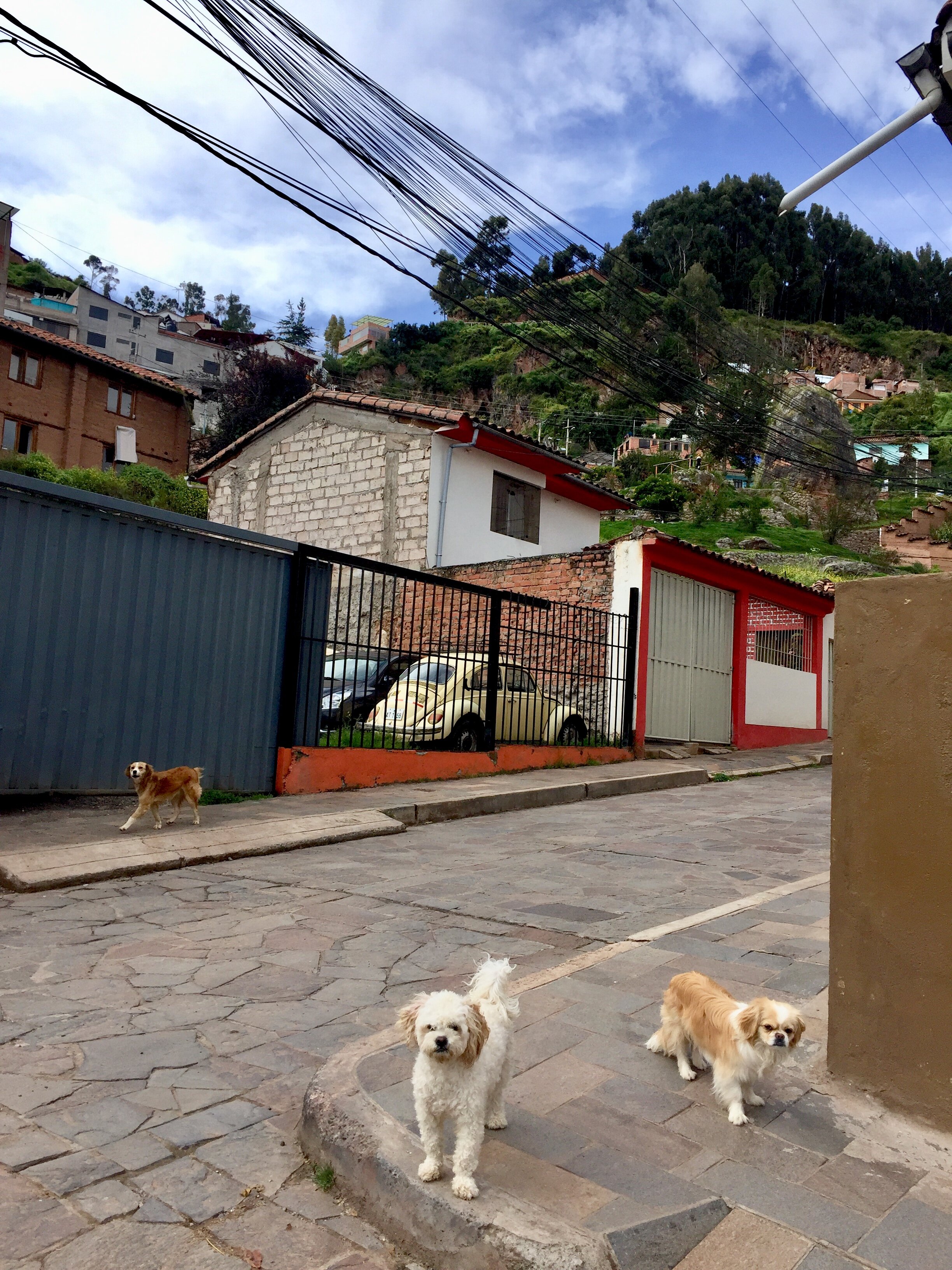
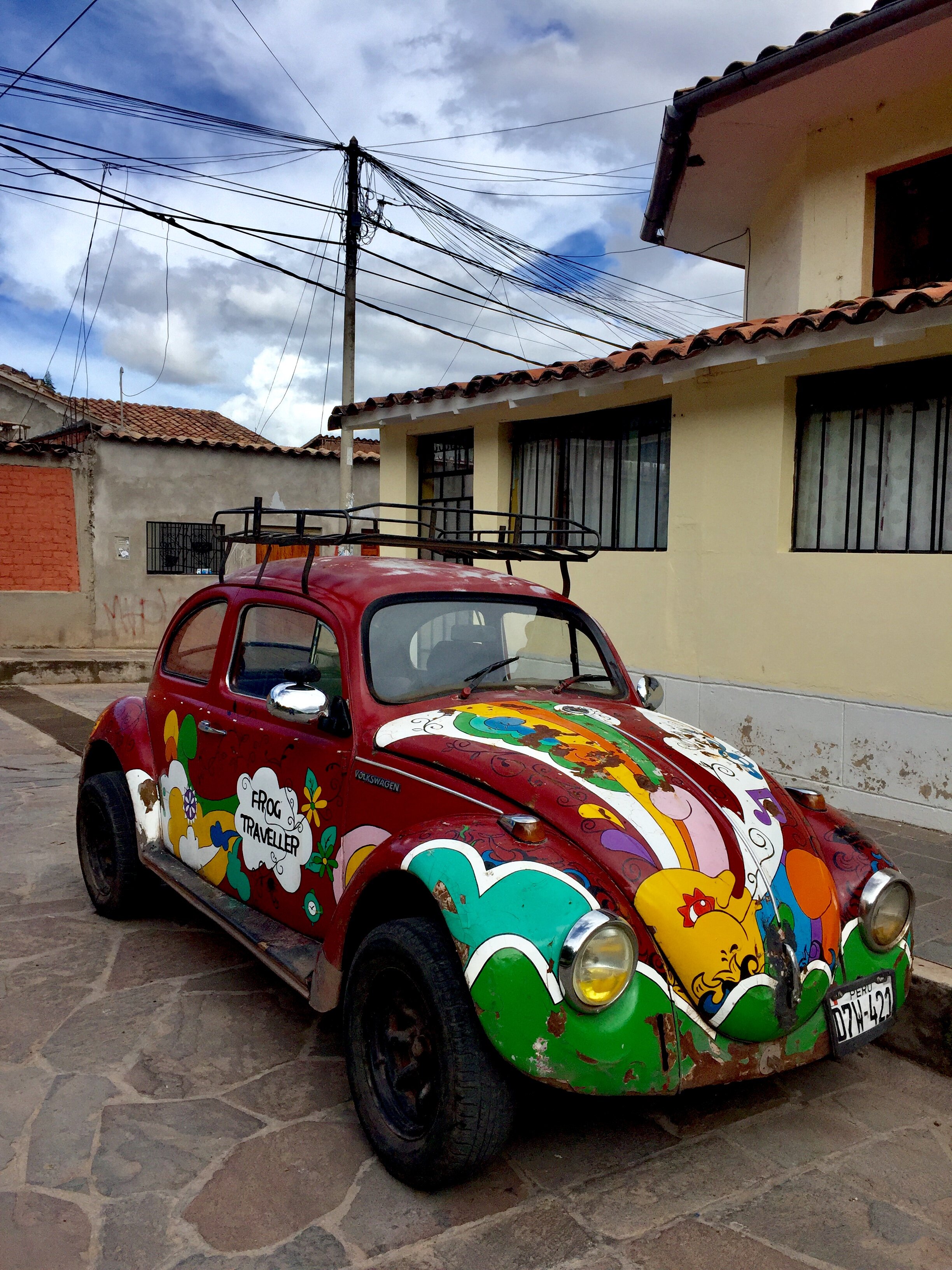
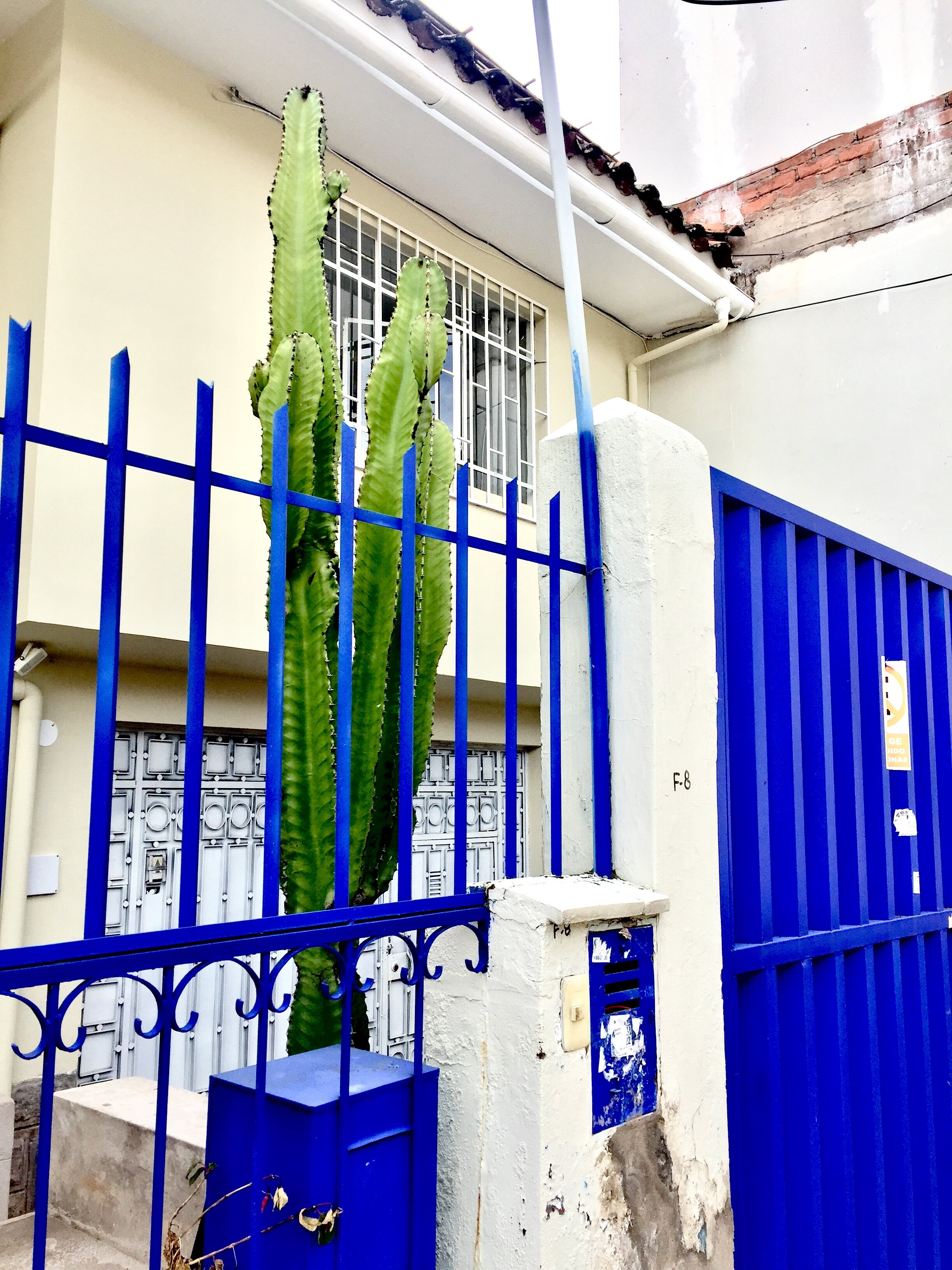
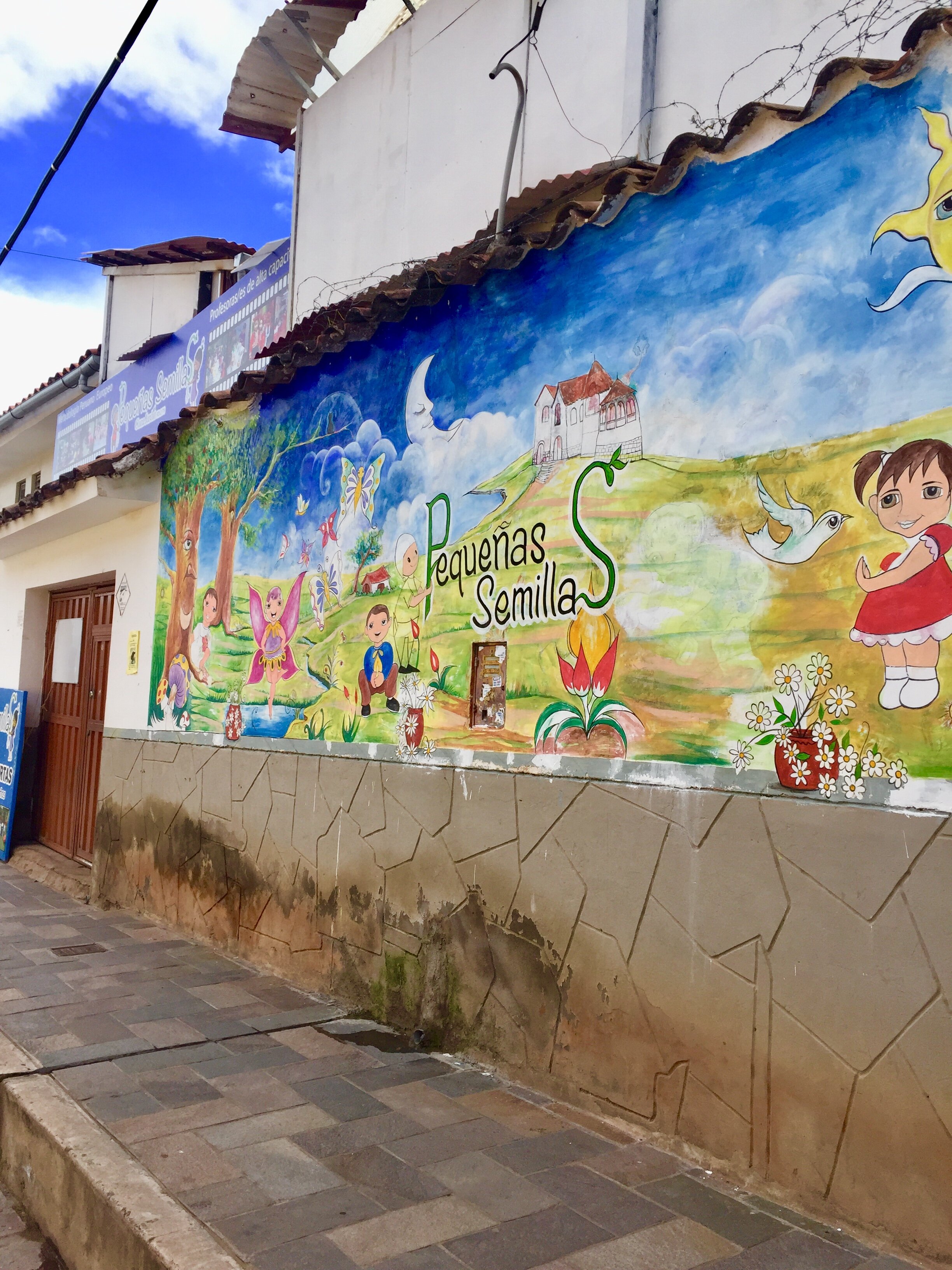
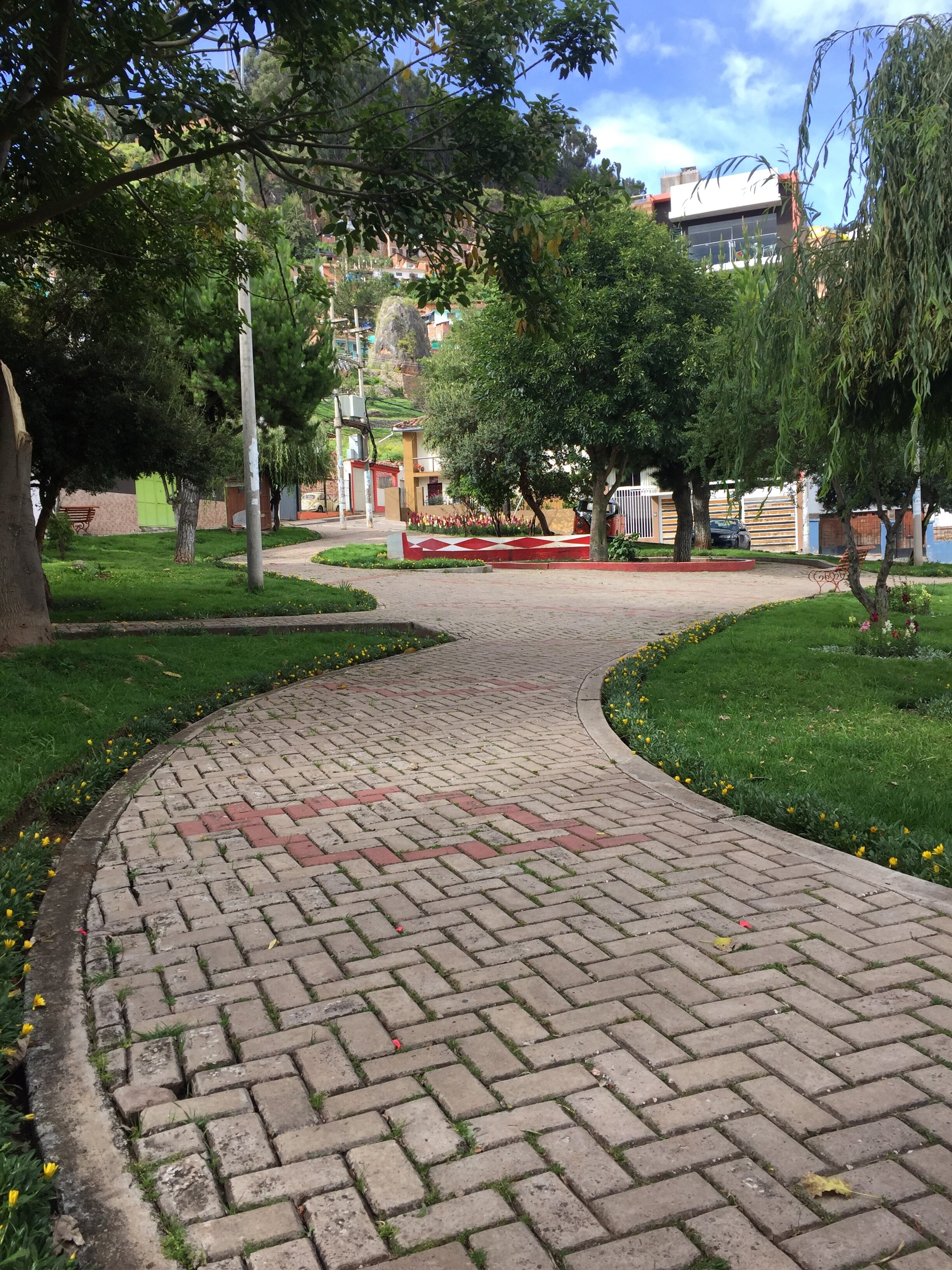

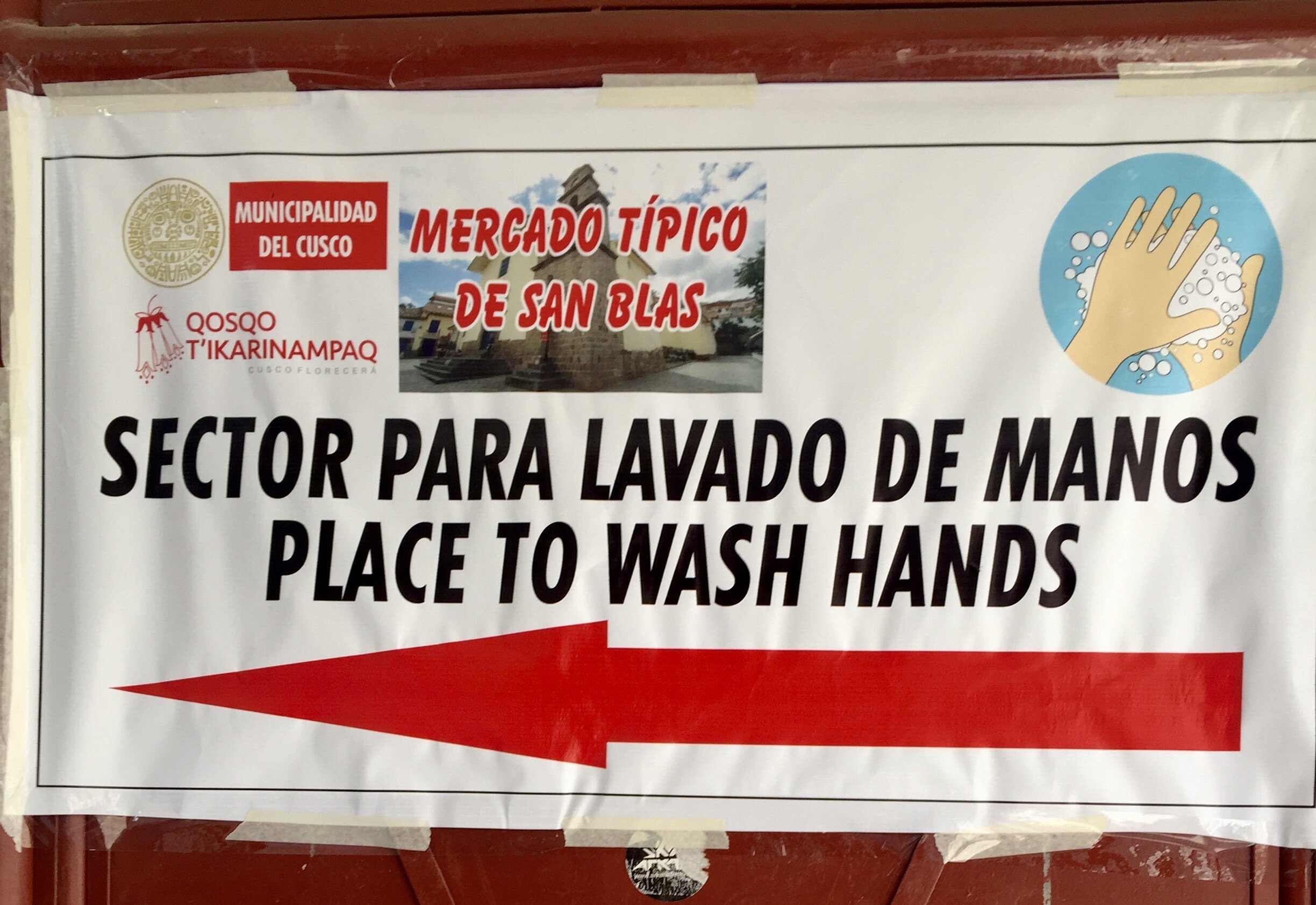
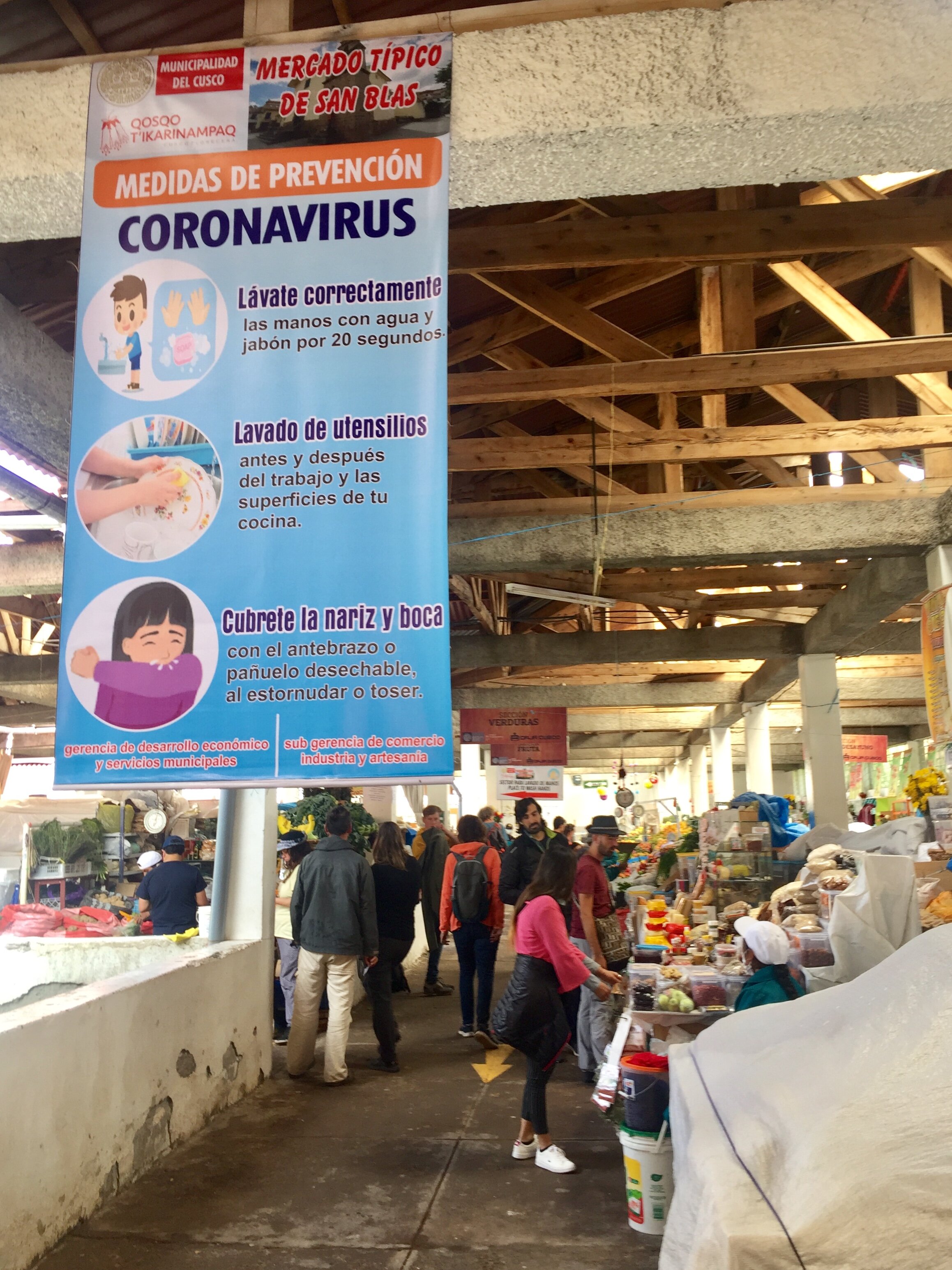
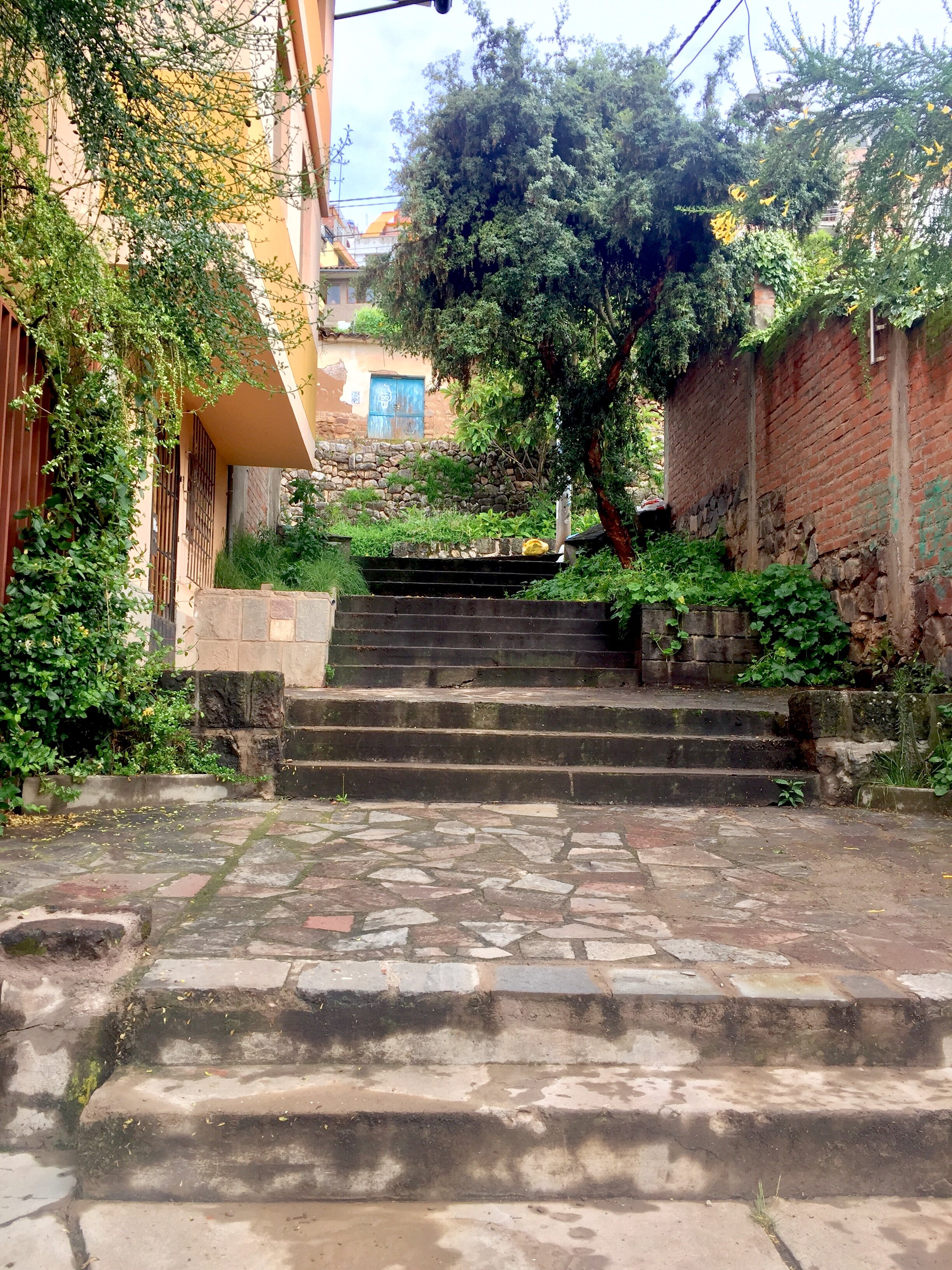
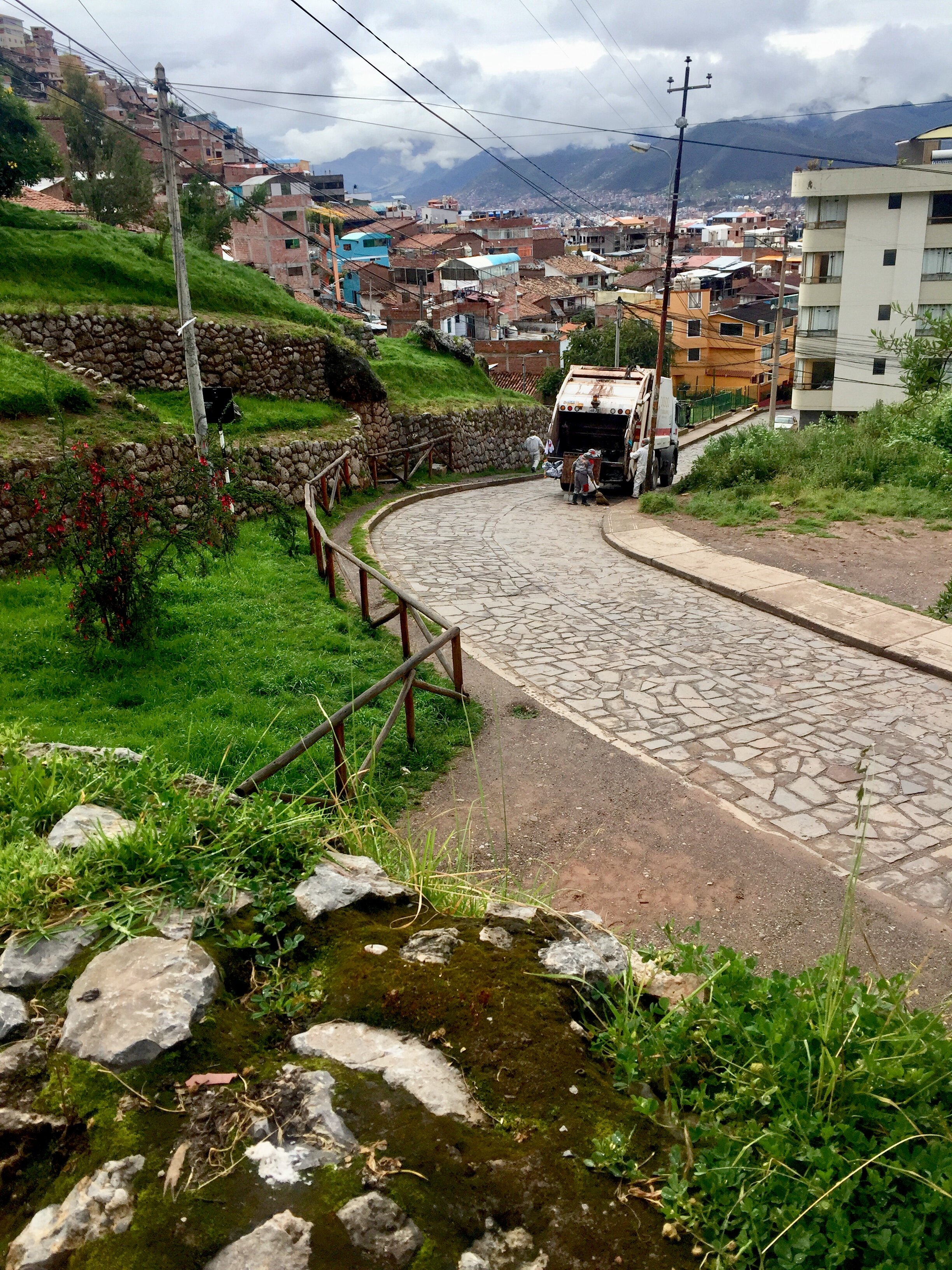
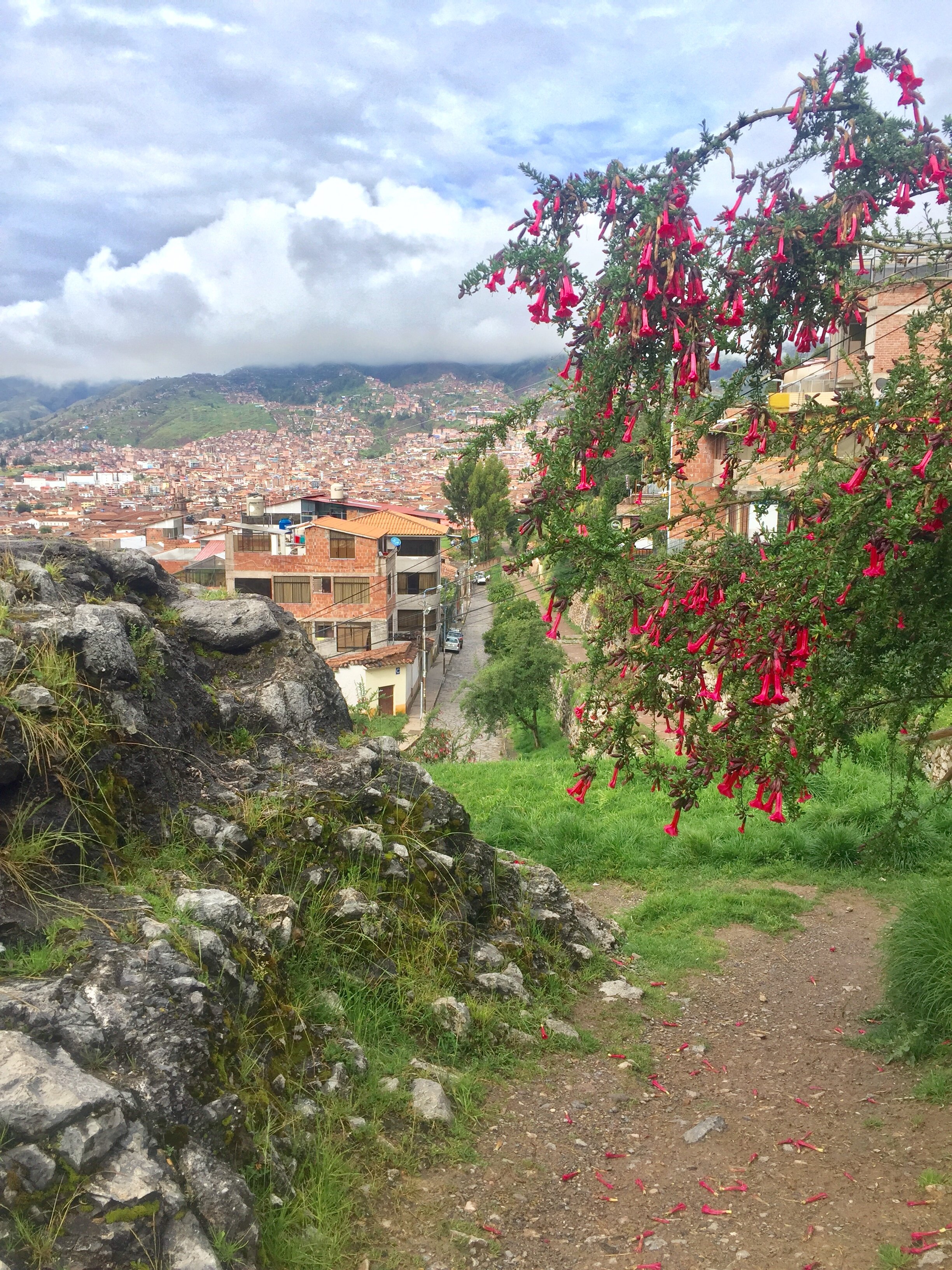
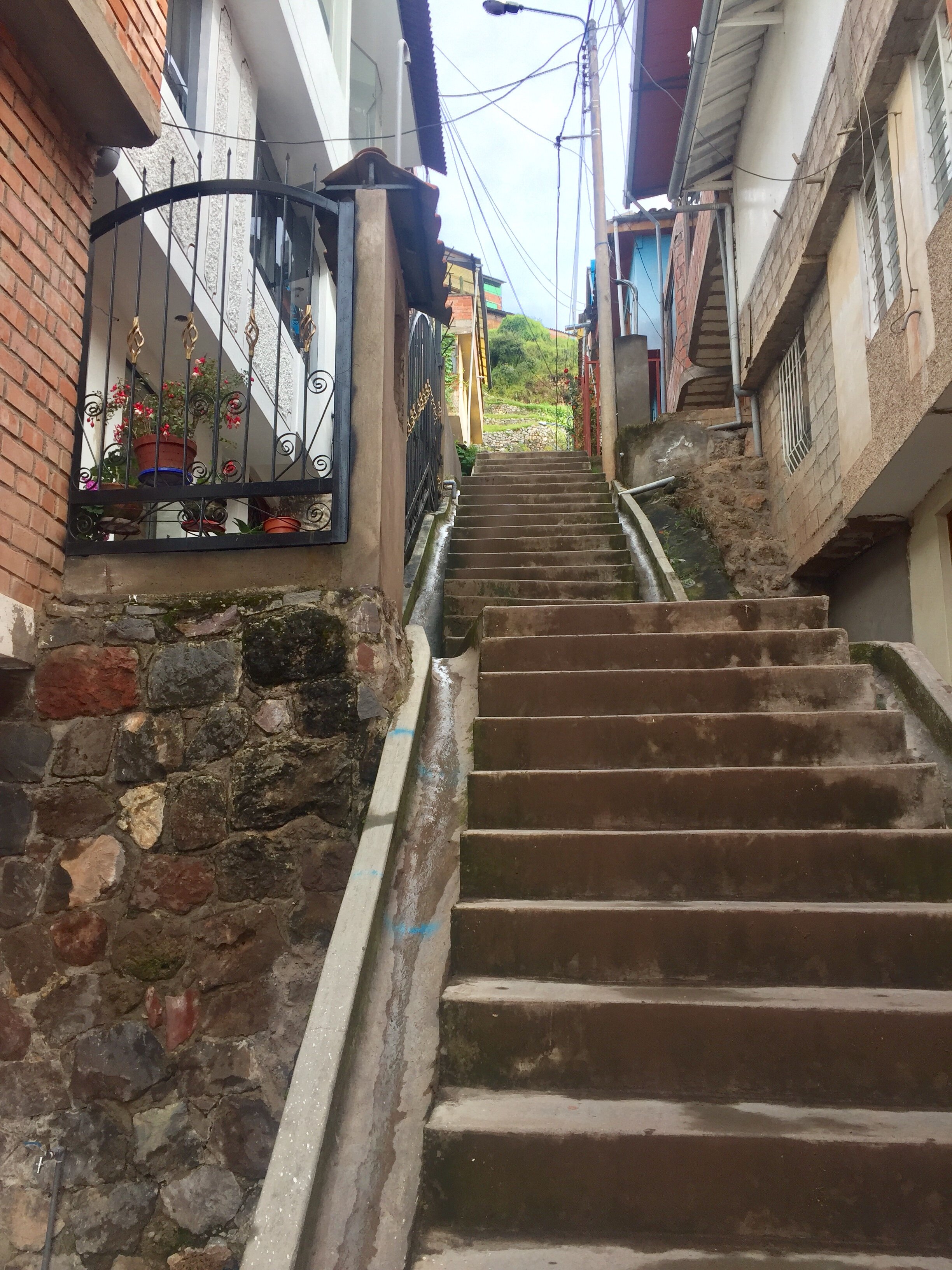
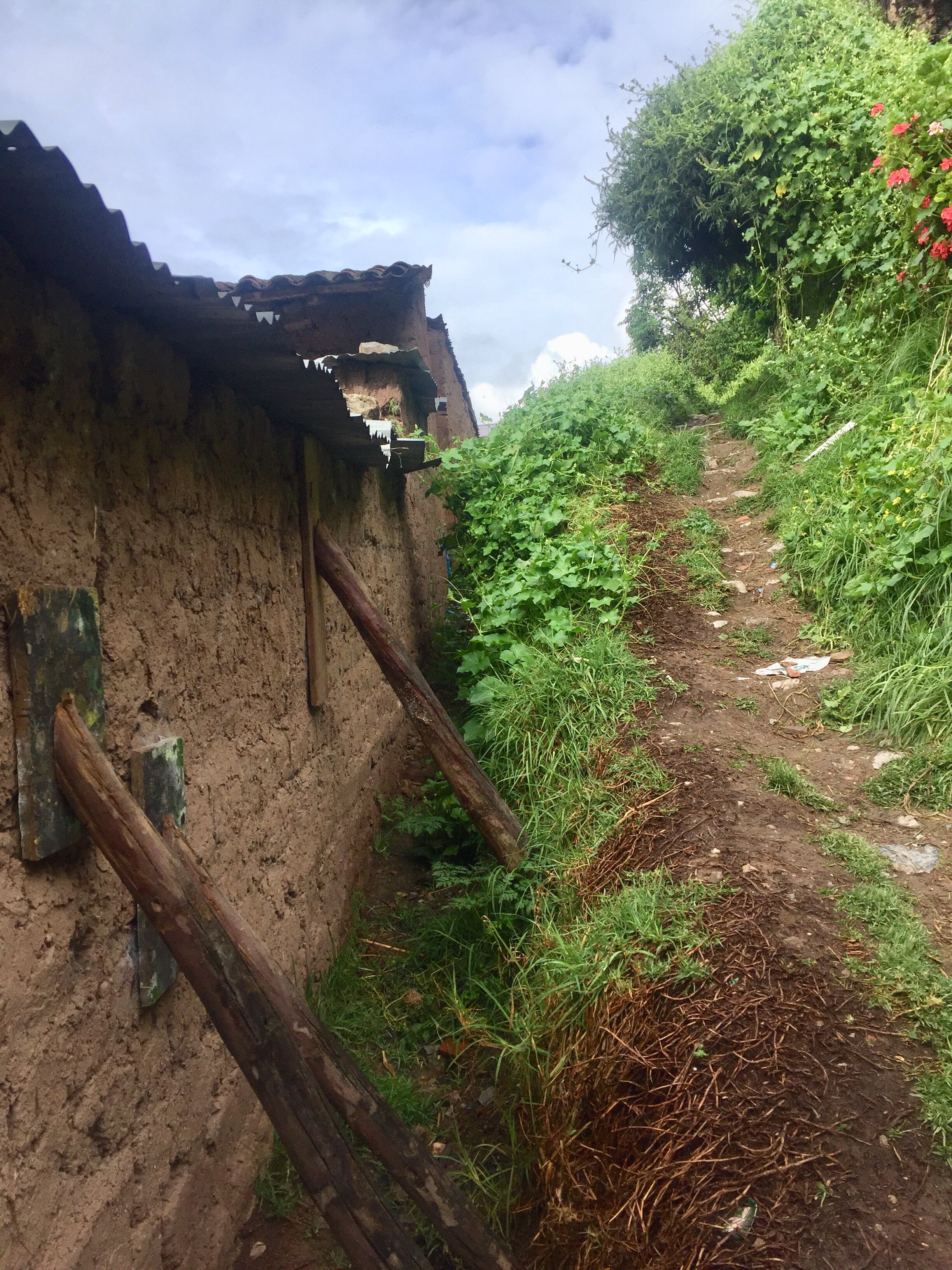
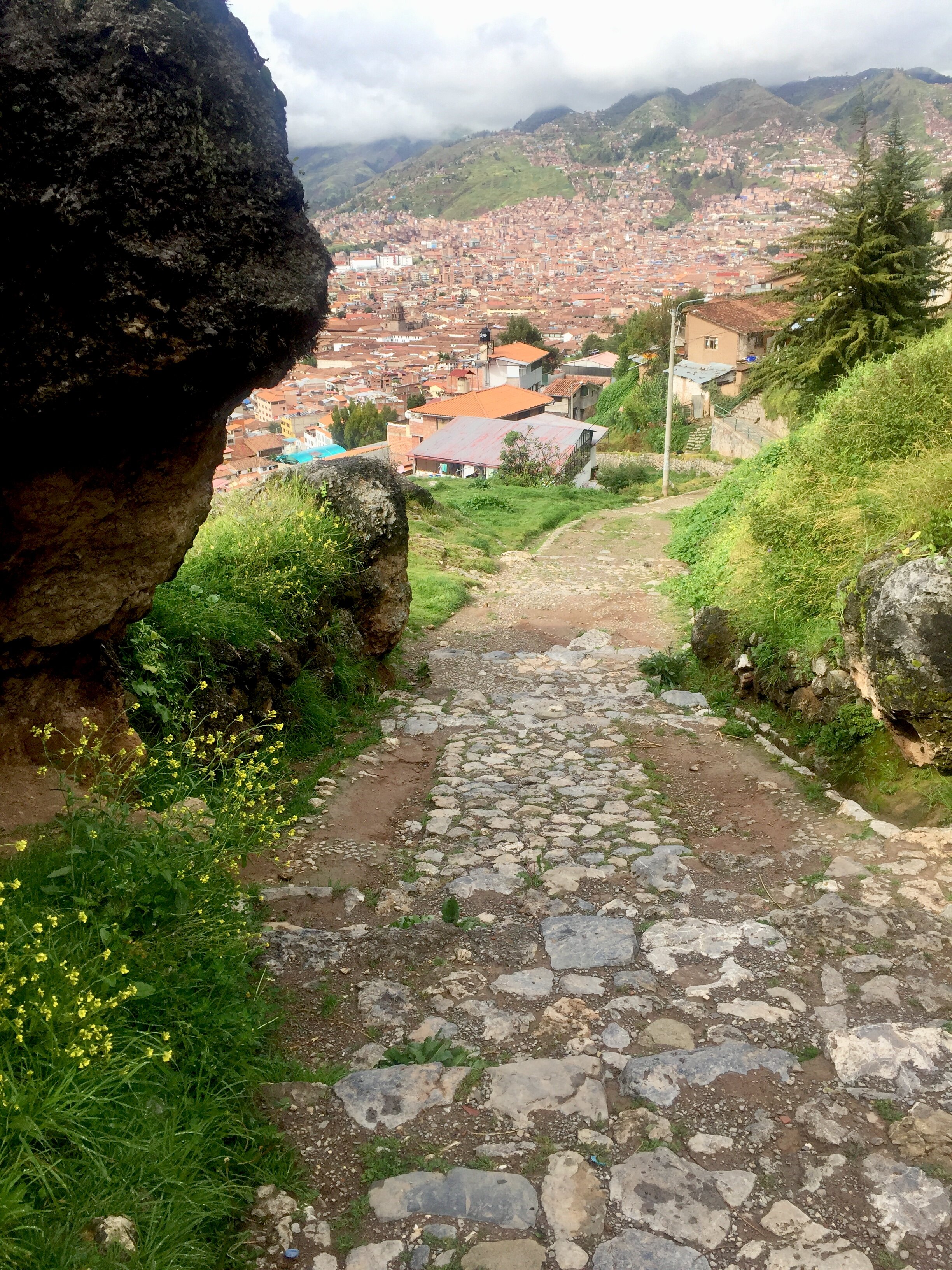

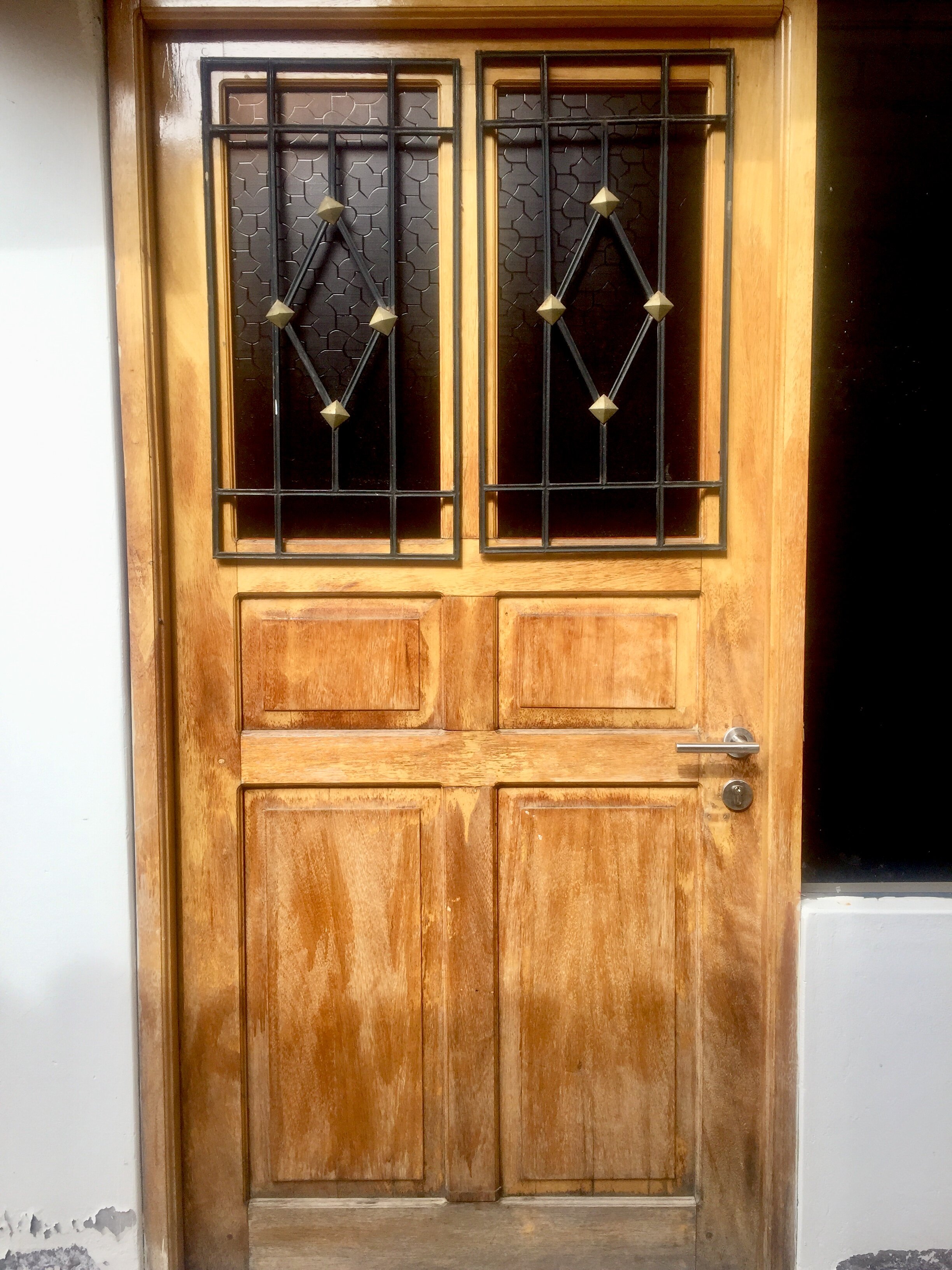
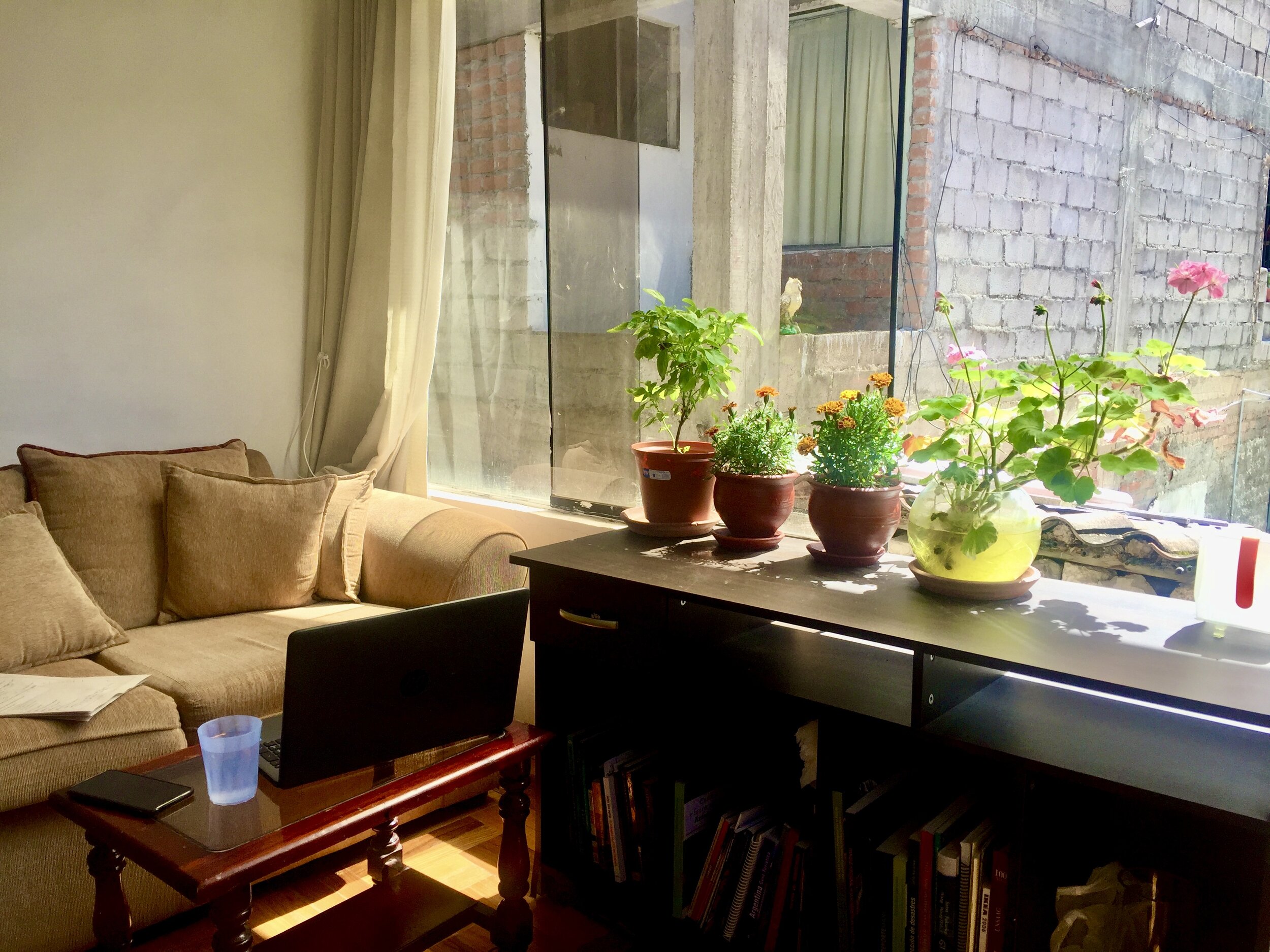
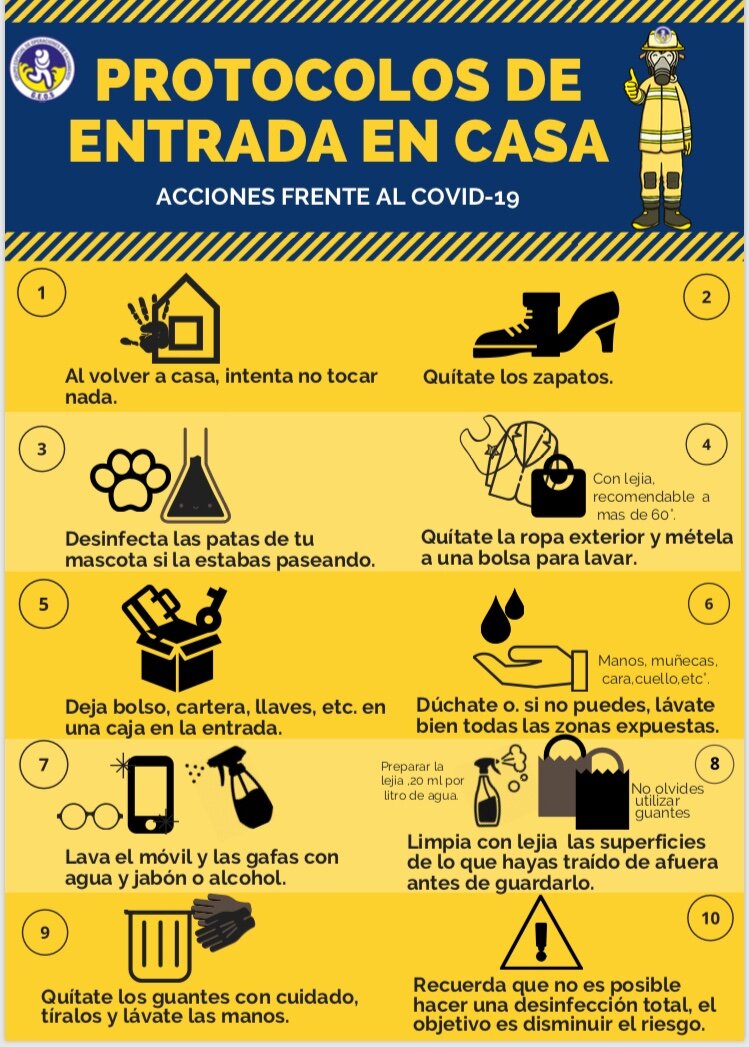

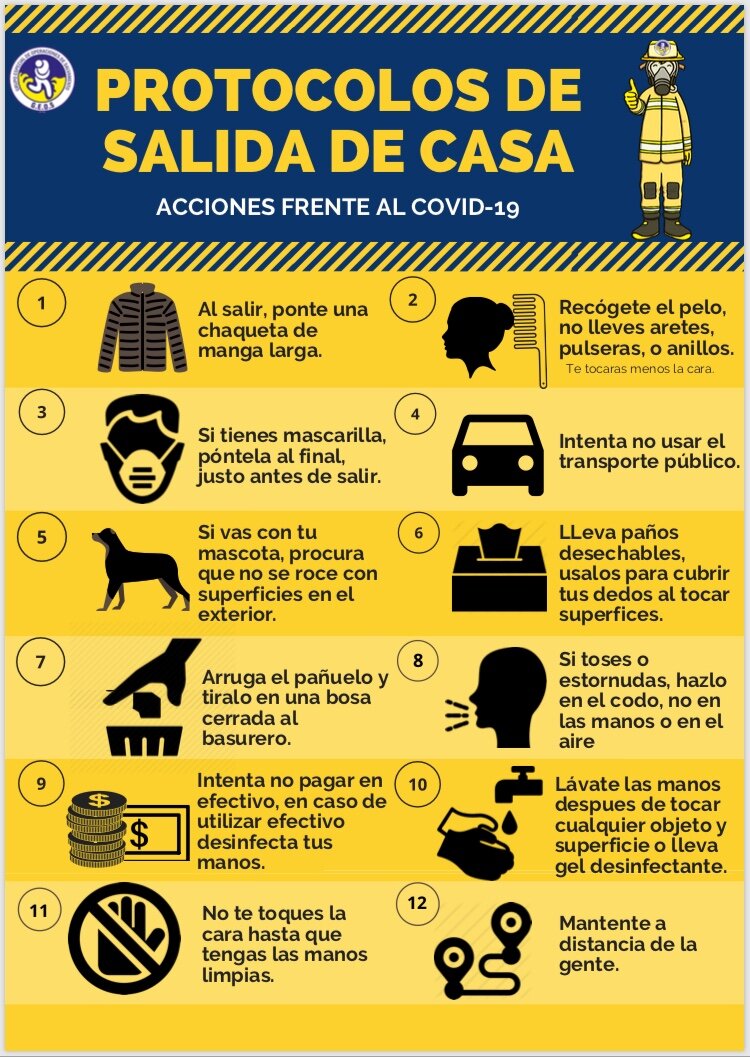
Sunday, 15 March, 2020
At 8pm tonight I watched the president give an address, telling the nation that we Peruvians have been through a lot together and we have to work together to confront a new crisis. The borders are closed as of midnight, today, Sunday. All airports, sea ports and land border crossings are closed tonight. President Vizcarra is calm, reassuring and firm. We will do this together and we will prevent a crisis in Peru.
Starting Monday, everybody will be confined to their homes. We will be allowed out to go buy food, to go to a pharmacy or to get medical help. Essential employees, such as those in hospitals, pharmacies, fire fighters, sanitation workers and city officials will be allowed to go to work. Police and military will be in the streets enforcing this. The president promised that water, electricity and sanitation would continue as normal.
We are inside through the end of the month.
Monday, 16 March, 2020
I got up early to get to work by 7, rather than the usual 9am. Everybody was there, trying to get to the office before the police start cracking down. I was hoping to just grab my computer and dash back home, but I was at the office until after 1pm.
I work at a trekking agency in Cusco, which has been a lot of fun, but which is now very precarious. COVID-19 hit at the worst possible time for the tourism industry in Cusco. We are just recovering from the rainy season, when we typically have very, very few tourists. This year was especially hard because a landslide closed the Inca Trail on January 23. The Inca Trail is normally closed all of February, because of the heavy rains. This year, a landslide killed three people and closed the trail a week early. It’s a financial hit when we lose the groups we had booked to take on the Inca Trail, or any of the other treks that lead to Machu Picchu. This February was so rainy, and so warm, that numerous floods and landslides affected communities all through the Peruvian Andes. The Salkantay trekking route was too dangerous. The Inca Trail was closed. The very popular archeological area in Pisac was closed due to a landslide which blocked the road. Giant sections of glaciers melted off, causing tsunami-like waves of mud crashing down valleys, sweeping away villages and anything else in their way. February brought all kinds of tragedy to the people of the Peruvian Andes.
Then, in mid-February, the government announced that it would not be opening the Inca Trail as usual on March 1st. It would open March 16th. Again, we scrambled, trying to find suitable options for all our clients who had signed up to do the Inca Trail between March 1st and 16th. Another financial blow.
When President Vizcarra announced that Peru was closing the borders and any non-essential services, that also kept the Inca Trail closed before it could open. Machu Picchu is closed. All archeological areas, Incan constructions and other tourist attractions are closed. Even if our clients could enter Peru, we can’t take them anywhere. Our guides are not allowed out of their homes except to buy food and medicine.
Today, Monday, our last group who was still in Peru came back to Cusco from visiting Machu Picchu. They have a flight for tomorrow, Tuesday, but we decided to take them to the airport immediately. I told them to talk with the airlines at the airport and try to get any flight, on any airlines, to Lima. Maybe from Lima, the five of them can get home to Canada. They called me a couple hours later. The airport was already closed when they got there. They are back at their AirBnb, trying to get through the busy phone lines to the airlines. I suggested they also try to contact the Canadian embassy for help.
On the way home from the office, I stopped at the market that is closest to my house. I live in the Lucrepata neighborhood of Cusco and my closest market is the Mercado San Blas. The market seemed somewhat normal, although more stalls than usual were closed. I managed to get some basics: onions, sweet potatoes, fresh peas, spinach, avocadoes, tomatoes, bananas, papaya, pasta and eggs. I had already stocked up on coffee and chocolate over the weekend, while other people were stockpiling rice and toilet paper.
Leaving the market, I saw the laundromat was open and when I asked, they said they were open today only. They will be closed afterwards. I rushed home to get my sheets and towels, which I usually have done at the laundromat, since I don’t have a dryer at home.
Monday afternoon I stayed at home, answering emails of panicked clients that were trying to get home or trying to get to Peru. I checked in with my housemates, to be sure that everybody had food and knew what was going on. I live in a house with three other women: one from the UK, one from Venezuela and one from Switzerland. We opened a bottle of wine and strategized about how to ensure we all had enough food and things to do. I gave the only book I have in French to my housemate from Switzerland.
Tuesday, 17 March, 2020
Today is the first day of full lock down. Call it social isolation, call it quarantine, we are all basically on house arrest. I am not going outside today. I expect that the first day will have more chaos and more police in the streets. I have enough food and I’m going to wait until people have settled in before I try even going across the street to the park.
I am spending most of the day answering emails anyway. I’m trying to convince people to postpone their trips, rather than flat out cancel. Normally, deposits are non-refundable and there are fees for changing the dates of your trip. This is because the Inca Trail permits sold by the government are non-transferable and non-refundable. However, the government has announced that they will be flexible with cancellations and date changes.
This is unprecedented. It’s also unclear exactly how that will work and if only the permits in March are changeable. For now, I’m offering people 100% of their deposit applied to a trip later in 2020, or even to 2021. If they want to cancel completely, we can only refund 50% and only by PayPal. Even with just 50%, with most people willing to postpone, trying to refund those who cancel is a big stretch. We quickly drain our PayPal account, one of our savings accounts and start drawing on a credit card. I’m getting texts from the boss, who is at the bank trying to sort things out. At least the banks are still open.
I’m worried about my coworkers. On Saturday, before the president even announced the border closures and country-wide home quarantine, six people from my office were told to take vacation. This is basically unpaid leave. Today, three more were told to do the same. That leaves me, three people who have been put on part time, with their salary cut in half, and Saul, who owns the company.
I am also very worried about the guides and everybody else in Cusco who works in tourism. This could not come at a worse time. Most guides have worked very little, if at all, in January and February. That’s normal. Everybody saves up for that. The problem is that when February is over, they need to get back to work. Not everybody has savings that will carry them much past February. We were already bracing for the Inca Trail being closed through March 15th. Now we have no idea when tourists can or will come back.
March is shot. With the borders closed, there is no way that tourists will be able to get to Cusco. Any who are already here are not allowed out of their hotels and all of the trails and Inca sites are closed anyway. There will be no income for any of us in March, and the refunds are quickly bleeding out the savings accounts. Even if the state of emergency ends when it is supposed to, and even if the borders open up again on April 1st, April will not provide any income for the guides or the company. Nobody I’ve spoken with thinks that we will actually be able to get back to normal in April.
Honestly, I will be surprised if they can open Machu Picchu in April.
Wednesday, 18 March, 2020
Today I started my morning with more panicked emails of people who are heartbroken that they won’t get to visit Machu Picchu this month. I’m trying to get through all of the March reservations before I tackle April. So many people have planned for years, saved for years and wanted this trip of a lifetime to Peru. Many of them booked their Inca Trail trek a year ago. All of them wanted to see Machu Picchu.
I spent all morning trying to calm and reassure people. The emotional exhaustion of all of these emails is starting to wear on me. Plus I have been notified that we are out of money. We have drained the savings accounts giving refunds and I have to talk people into postponing their trips, not canceling them. We will postpone to 2021 without any fees and transfer 100% of their deposit. Unfortunately, not everybody is going for this and we will have to find a way to get some money for refunds. As of today, the only people left working are me, the manager Dioselina, who is only working part time, and Saul. After lunch I just couldn’t sit back down. I ventured out to walk around the park, which is just across the street from my house. Considering that I could be on my way to one of the nearby pharmacies or corner markets, I didn’t feel like the police would hassle me. I took pictures of the neighborhood Volkswagons, all seven bugs are in their usual places and so is the van modified to be a pickup. I photographed the cacti that I always admire when leaving my street to walk to work. I didn’t venture more than three blocks from home.
Today my parents were supposed to arrive in Cusco. It’s a visit we’ve been planning for months. I really want to show them where I live and work, introduce them to my friends and show them around Cusco. I want to take them on the tour through the Sacred Valley and take them to Machu Picchu. I want them to try the chocolates at Dayna, the chocolate shop I walk by four times a day, on the way to work, home for lunch, back to work and home in the evening. They’re going to come when it’s possible, but obviously there’s no telling when that will be.
Tonight one of my housemates invited a friend over. I’m pretty nervous about having people over. Not only could he have had contact with somebody at the restaurant he worked at last week, but honestly I could have picked the virus up at the wedding I went to last Saturday. It’s only been four days since the wedding. If I have the virus, it could be another week until I have symptoms. Four of us living in one house is bad enough and I’m uncomfortable with other people coming over.
The four of us all had quite a bit of exposure to people last week, before the State of Emergency was declared on Sunday. My housemate from England teaches English and was exposed to all of her students. My housemate from Venezuela works in a restaurant and was exposed to tourists from all over the world. My housemate from Switzerland volunteers at an orphanage and was exposed to all of the children there. My office job kept me away from people, especially since we haven’t had any new groups able to get to Peru for about a week anyway. It’s the wedding that was my big exposure hazard. As long as I don’t get exposed during quarantine these 15 days, I’ll know for sure that I didn’t catch it at the wedding by April 1st.
Thursday, 19 March, 2020
Today I tried jogging in the morning, hoping that nobody else would be out yet. I did see a couple other people, but I was running down the middle of the street and they were on the sidewalks. It’s kind of nice to be able to run right down the middle of the street. Pedestrians do not have the right of way in Peru and on a normal day it would be suicide to run down the middle of the street. However, these days have been anything but normal.
During my jog I went by the San Blas market, expecting it to be closed like it was Tuesday and Wednesday. I was shocked to see people unloading cars, carrying big wooden crates of produce into the market. Peeking in through the doors I saw people in hazmat suits spraying down the cement floors and pouring bottles of bleach in a big tub. As soon as I got home I texted my housemates to let them know that the market was going to open and I planned to go get more food. Even though we’re keeping the shared kitchen clean, we’re all spending most of our time in our rooms, texting back and forth between the four of us.
I grabbed my wallet, a couple fabric shopping bags, a bottle of hand sanitizer and a mask. I have always carried a couple hospital masks in my first aid kit, just in case. I could have never imagined needing to use one of them in these circumstances. It’s not that I’m particularly afraid of breathing in the virus. I’ve read too much about how masks don’t actually keep you from getting the virus. It’s that I don’t want people to be afraid of me. The women in the market that I usually buy from know me. They know I live here and haven’t traveled out of Cusco in a while. They see me all the time. It’s the people who don’t know me that I don’t want to scare. I look so obviously foreign and tourists were arriving from Italy as recently as a week ago. I could look Italian, to a person who doesn’t know me.
When I got to the San Blas market, there was a giant water tank and a pipe with 3 spigots coming from it next to a table with bottles of liquid soap. I washed my hands, stepped through the tub of bleach to sanitize my shoes and put on my mask. The people who know me were happy to see me, but others kept their distance. I bought tomatoes, cucumbers, onions, sweet potatoes, garlic, ginger, fresh peas and tarwi from the woman I usually get vegetables from. Tarwi is the seeds of a domesticated variety of lupine. The seeds are normally very toxic, but this variety has lower toxins. You still have to soak the seeds, and I bought them wet, pre-soaked. My friends who are guides here tell me that it will be the next superfood to go global. Peruvian quinoa definitely has gone global and is a superfood in many ways. I’ve been meaning to learn what to do with tarwi and now I should have plenty of time to figure it out. Previously, I’ve had it raw in salads or made into a puree and served as a side dish like mashed potatoes.
At the market I also got a kilo of dried black beans, a couple papayas, a couple mangoes, a kilo of bananas and two avocados from my usual fruit vendor. She looked happy to see me and laughed when I had to take my mask off because my glasses were fogging up. I do not know how to wear a mask without fogging up my glasses. I’m sure there’s a youtube video that could help me on that one, but I still haven’t bothered to look for it.
On the way home I stopped in the corner market for a bottle of Chilean 2017 Cabernet Sauvignon and a bottle of bleach, then stopped at the bakery, simply because it was open. The bakery looks closed but there is an arrow on the door that points to the window, with a sign saying that they will take orders through the window. There is a grill of metal bars on the window and the baker stood back several feet to take my order, even though I had put the mask back on and she knows me. For 1 sol, which is less than 30 cents, I got five whole wheat rolls. Ordering my bread, I noticed that she had just taken a giant sheet of croissants out of the oven, so I ordered 8 croissants, which was only another 4 soles, just over a dollar.
Back home I texted my housemates that I had brought back two croissants for each of us. Individually, they snuck out of their rooms to come get their croissants and thank me. It is starting to feel normal how much we are avoiding each other.
The rest of the day I was stuck with my laptop, wading through work emails, trying to figure out how to respond to people who wanted to cancel or wanted reassurance or wanted to change the dates or wanted something that I just couldn’t figure out. Most of the people who write to us are native English speakers, but enough aren’t that I am sometimes at a loss to know exactly what they are trying to communicate to me. Taken all together, these emails are so discouraging. I wish I could be more reassuring, more confident that by May, of course, everything will be just fine and you will love your trip to Machu Picchu!
Tonight is the first night of curfew. Everybody must be inside by 8pm and we are not allowed out until 5am. As with the police and military enforcement of the quarantine, this makes me uneasy but at the same time comforted. I want to know that people are taking the quarantine seriously. If they’re not taking it seriously, I am actually relieved to know that the police or military will change their minds. This does not make it easier for me to cheerfully reassure people that yes, you will be able to reschedule your trip to Peru. Yes, you will get to see Machu Picchu in 2020! Yes, it will be safe to travel to Peru, soon, very soon! We appreciate your patience!
Friday, 20 March, 2020
Today I am not leaving the house. I am going to contact all of the groups who have booked with my trekking agency in April. I’ve already communicated with everybody from March and more than half of our April reservations too, but there are some I haven’t heard from. I’ve drafted an email which I hope conveys that Peru is taking this seriously and will prevent a big outbreak, that we are taking this seriously and will protect our guests and staff members, that they should keep their booking with us and just postpone it to later in 2020 or even to 2021, that we are being generous by applying their deposit (which is usually non-refundable and non-transferable) to another trip without any fees, that they will have a fantastic trip to Peru when things settle down and that they don’t want to ask for a refund. This strategy works for some, not for others. We have already sent so many refunds that Saul told me we cannot send any more. I cannot offer any more refunds. People who insist repeatedly on a refund can be offered 50% but not for another 20 days. We don’t have any money to refund.
I spent most of the day on email, taking breaks to Facetime with friends, message others and find out what my friends around the world are going through. My parents in Idaho are home and staying away from people, when they do go out. I have friends in various forms of quarantine in France, Chile, Laos, England, Morocco, Canada, Australia, Costa Rica, Bali and all over the US. Today one of my friends, who has been in the US for three months, is going back to Shanghai. I have no idea what to think about this. She’s in a hotel in Shanghai right now, waiting for a COVID-19 test. If she tests negative, she’ll get to go back to her apartment with her cats and be in quarantine for another 14 days.
I can’t answer any more depressing, desperate emails. I can’t focus on my book. I can’t handle reading any more news. I’m spending the rest of the evening with Netflix. It’s exactly the escape I needed. Why didn’t I do this earlier in the week?
After the first two episodes of the second season of the British show Sex Education, I made the mistake of checking my email. Not work this time, but my personal email. At the top of my inbox, sent four minutes ago, is an email from the US Embassy in Lima. The email starts: The Peruvian Ministry of Health confirmed 263 cases of COVID-19 in Peru as of Mar. 20, 2020 at 1:00 PM.On March 14, the Department of State authorized the departure from any diplomatic or consular post in the world of U.S. personnel and family members who have been medically determined to be at higher risk of a poor outcome if exposed to COVID-19.In response to the ongoing COVID-19 outbreak the Peace Corps are in the process of evacuating their Volunteers from Peru.On March 20, the U.S. Embassy repatriated a group of medically vulnerable U.S. citizens in country, as well as a limited number of Peace Corps Volunteers and U.S. Embassy personnel and family members.
I was a Peace Corps Volunteer in Morocco 2005-2007. I know that they do not take evacuation lightly. I served in Peace Corps at a time when terrorists were bombing the US Embassy in Rabat, when there was active terrorism in Morocco. I lived in Bangladesh during the elections in 2013, when the streets were often so violent that I had to stay home for days at a time. I heard bombs go off in my neighborhood and tried to not look at the news, which always led with the death toll from the day before, not from a virus, but from people actually killing each other. I lived in Istanbul when the US Embassy in Turkey was sending me messages about what areas of the city to avoid because of the violent protests there.
Somehow, none of those other messages from US Embassies rattled me so much. This feels very different. The terrorism in Morocco, clashes between civilians and police in Turkey and wildly violent political protests in Bangladesh all seemed like temporary problems. It would be unsafe for a day or two, at most five, then things would go back to normal. I just stayed home and was fine. I was never at any risk of anybody coming to my home to hurt me. It was scary, but never felt like something I couldn’t get through. I never felt unsafe at home.
This feels very different. Embassy employees and Peace Corps Volunteers are evacuating from Peru. Countries all around the world are closing their borders. I have only been on forced home quarantine for five days, but even if the quarantine is lifted on March 31, what kind of restrictions will be in place? Would I be safe if I was allowed to go back to my normal life here in Cusco? Do I want to go back to my normal life here in Cusco?
I will honestly be surprised if the State of Emergency declared by President Vizcarra will actually end on March 31. The news around the world seems to show that this will not be over with a 14 day quarantine. That is probably what makes this feel so very different. There is no end date and nobody has any idea what will happen in Peru, or in any other country, for that matter. We simply do not know.
Saturday, 21 March, 2020
I have to go outside. Yesterday I didn’t even go downstairs. I will not make it another ten days if I can’t go outside. I don’t care if I am only allowed outside to buy food and medicine. I have to see green around me and walk somewhere.
I get up early, but not as early as I wanted to, put a load of laundry in the washing machine and sneak out of the house. I walk uphill, towards the edge of town, which really isn’t that far. I pass one guy who seems very friendly, greeting me in Spanish and asking first if I’m from Germany. When I say no he asks Belgium? I say the United States and he welcomes me to Peru. I didn’t want to stop to chat and tell him that I live here, that I’ve been here since long before COVID-19 had infected any human beings, that just like most of Cusco, I work in tourism and that I’m afraid I won’t have a job in a few weeks. One trekking agency already declared bankruptcy. I don’t know how long we will hold on.
The only other person I see is an elderly woman who covers her face with part of her cardigan when she sees me and refuses to make eye contact when we walk past each other. At least she does answer my “buenos días” as she hurries past me.
I avoid streets, knowing that the police and military will not think it’s such a great idea to just go for a walk. Even alone. Even early in the morning. I should not be doing this.
I walk up stairways, behind houses to other smaller paths, leading up to a section of what was an Inca trail. It’s one of the many thousands of miles of Inca trails that are still found all over South America, from Colombia down through most of Chile. The Qhapaq Ñan, as the network of trails are known, spreads from Cusco north to Ecuador and Colombia, east throughout Bolivia and south to Argentina and Chile. I love walking on these paths. They are wide, paved with stone, feel so very ancient and remind me of one of the reasons I wanted to move to Peru in the first place.
I first visited Peru in 2013 and returned several times, including last March, 2019. It was just a year ago I was here once again as a tourist, leading my second group of high school students from Redmond, Washington to trek the Inca Trail. After I returned home to Seattle, in April 2019, I decided I should just move to Cusco.
I love Peru. I love the country, the people, the mountains, the jungle, the history, the wildlife and the fun mix of Spanish with a few Quechua words tossed in for foods, places and other names. I moved here to learn more about all of those things. I did not come here to learn what would happen in Peru during a global pandemic. I did not come here to see what would happen if a massive outbreak were to start in a country with only the most basic of healthcare systems. I hope I do not have to witness that.
Back home nobody else is up yet. That’s normal. I always get up early. They always sleep in. What did not used to be normal is my morning bleach routine. I put on rubber gloves, soak a sponge or cloth in bleach and wipe down “high traffic” surfaces. I wipe down the handles on the microwave and fridge. I wipe the knobs on the stove and the handles on the tap and water filter. I wipe the other doorknobs in the house and all of the light switches. I even wipe the handles on the broom and dustpan. This does not feel like paranoia. This is just part of the new normal.
I make my usual pot of coffee and fruit smoothie. Today I used my last mango, although I still have plenty of bananas and papayas. Over coffee I check my messages and am so happy to see some good news! My friend in Shanghai tested negative for COVID-19! Now she is home with her cats who are giving her the cold shoulder, obviously mad that she was away for a couple months. Even seeing her photos of the cats turning their backs on her make me smile.
I grab my work computer and settle down to my morning emails and work related messages. The first message from Saul is “The only option is rebooking. No refunds at all.”
There are fewer emails than yesterday, and many of them want to postpone their trip. Unfortunately, there are also some who want refunds. I am not used to saying no to people. There are a lot of skills that cross over from my 12 years as a teacher and my new role in customer service, in sales. Saying no is not one of them. Saying no is something that I got good at as a teacher. Kids need to know where the boundaries are. They will test them, but deep down they just want to know where they are. The simplest way to enforce a boundary is with a calm, confident no. I said no a lot, as a teacher.
In my new job at the trekking agency I don’t say no. I say that I will figure it out. I say that I will find a way to make it work. I say that if I can’t get it, I have a whole team of professionals who will get you what you want.
Working from home, I no longer have a team. I have very little direction and I have to start saying no to people. I would rather tell them that I have enough on my plate at the moment and that I will get back to them in a week or two. I know I can’t do that, but I wish I could. I don’t usually work Sunday morning. Maybe tomorrow morning I’ll sleep in like my housemates. I’ll bury myself under the blankets, with my heating pad, and try to sleep through the day.













